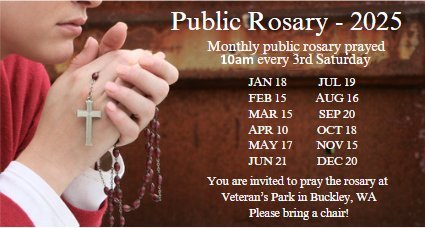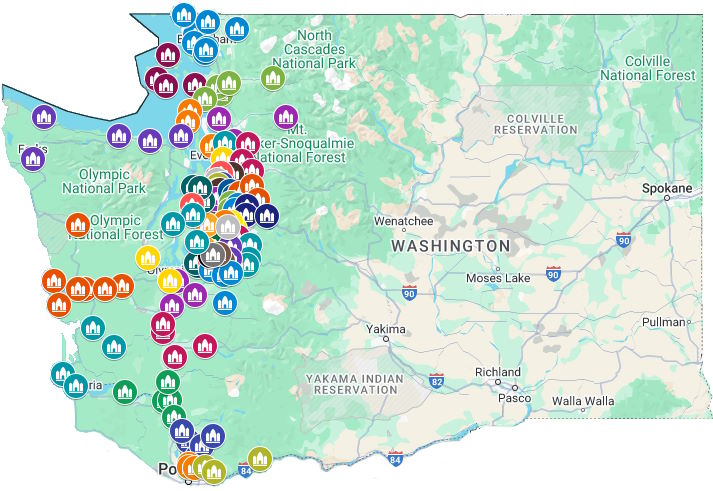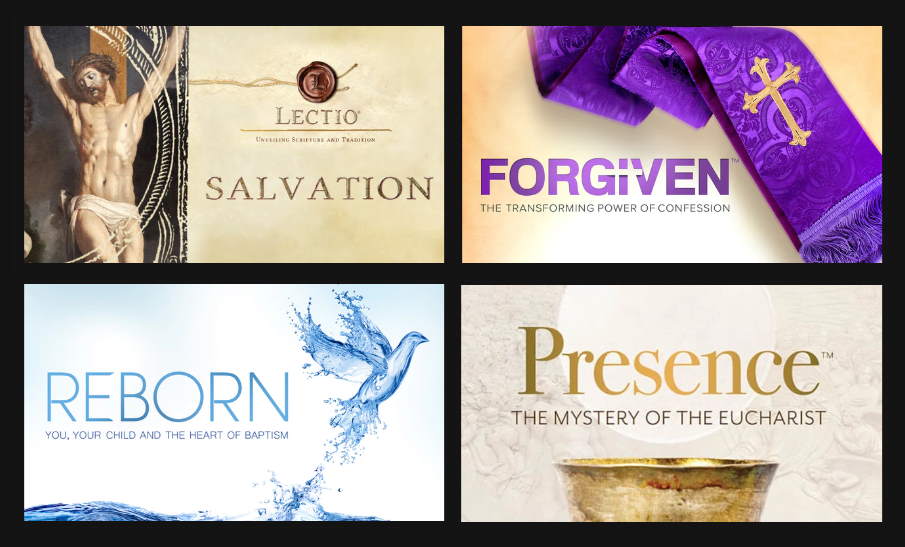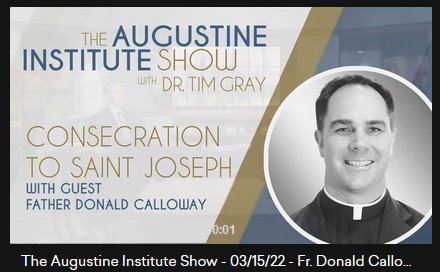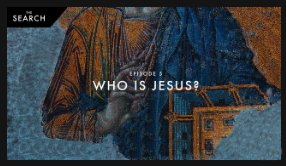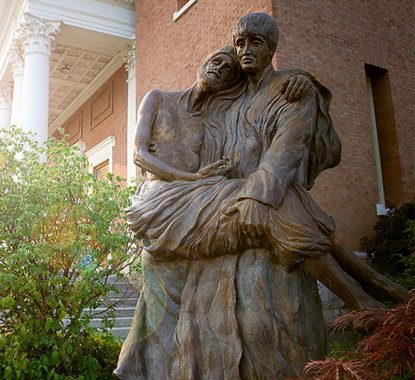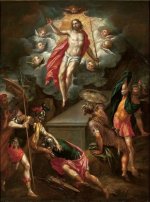Hope In God's Salvation
Homily 04 02 2017
5th Sunday of Lent A
Homily 04 02 2017
5th Sunday of Lent A
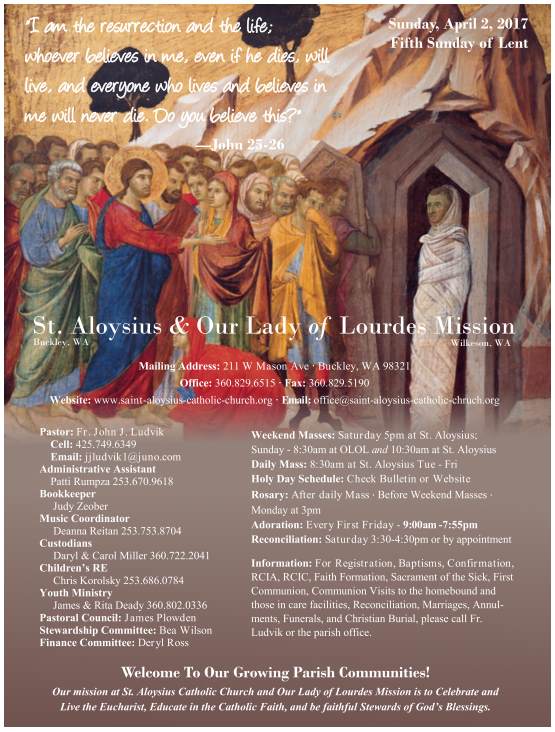 View our bulletin for this weekend
View our bulletin for this weekendView the Readings for this day
Homily 04 02 2017
There was a guy riding in a cab one day. He was new to the city and was looking for a good place to eat, so he leaned forward, tapped the cabby on the shoulder and said, "Hey, Buddy." The driver let out a blood curdling scream and lost control of the cab. He nearly hit a bus, jumped the curb and stopped just inches from going through a huge plate-glass window and into a crowded restaurant.
For a few minutes, there was dead silence in the cab. All you could hear was two hearts beating like bass drums pounding out a quick march. The driver finally turned around and said, "Man, you scared the living daylights out of me." The passenger, who was white as a sheet and whose eyes were as big as dinner plates, said, "I'm sorry, I didn't realize tapping you on the shoulder would scare you so badly." The cabby said, "Well, it's not your fault. This is my first day driving a cab. But for the last 25 years, I drove a hearse." (Patricia Ridpath, Laughter the Best Medicine, Reader's Digest).
If I'd driven a hearse for 25 years and somebody tapped me on the shoulder, you can bet I'd have screamed like a little girl. I'm kind of goosey anyway. Just ask some of my best friends, I get kind of jumpy. If I'm concentrating on something it's not hard to startle me.
To say that Mary, Martha, the Disciples and the mourners gathered at the grave Lazarus were startled, would be putting it mildly.
It was amazing film footage, from just a few weeks ago. We see a dark car driving by in the night when, all of a sudden, the trunk pops open and a woman is next seen jumping from the back, bouncing on the pavement, and then running away. She was carjacked, forced to get money from cash machines, then thrown into her car trunk. “Be sure to know where the latch is inside your car trunk,” the news person helpfully advised. Oh, yes, one more thing to think about.
But what can be more terrifying. Locked in a trunk? Locked in a basement? A child locked in a refrigerator? Or, two hundred years ago, a living person buried alive. Everything inside us pushes to get free, to escape, to live just a little longer. So maybe Lazarus, locked as he is in his tomb, doesn’t have it so bad. It’s all over for him, we think. He’s resting; he’s not trapped.
So why does Jesus raise him? Why are we astonished, along with the crowd, as Lazarus comes forth? Why is there a part of us cheering for Jesus, and cheering for him?
The revelation of Jesus this day comes on top of all the other gospel passages we have read this Lent, and it deepens them. It’s one thing to be trapped socially, as was the Samaritan woman; it’s another thing to be trapped in blindness. But, Jesus says, I will free you from the ultimate trap. I will free you from your tomb. I will make Ezekiel’s vision of the dry bones real for you.
It’s not easy for our culture to hear this. We have become Stoics, bravely agreeing that death is part of life, and we’ll take the bullet when it comes.
Of course, we want to put that off as long as we can; we’ll bankrupt ourselves on health insurance in the process. But, once death happens, it happens.
We had our decades; we had a decent enough time—most of us, anyhow. It would be greedy, selfish, to ask for more. So down we go, resting peacefully with Lazarus, at home in a world we imagine as nothingness.
But Jesus insists that the rock be pulled back. Oh, no, the relatives yell. This is messy enough and you’re going to make it worse. Let Lazarus sleep. Let us cry our tears, and that’s consolation enough.
But Jesus looks at us and asks: why do you have to look at things always from your point of view? Why do you think this is about you? It’s about me and the vision I have of you. It’s about the Spirit I put into when I saved you. Pull back the stone, I will show you.
For we may have shrunken images of our own lives, but God doesn’t. We may be content with our few decades, but God isn’t. We may be resigned to getting what we can and leaving it at that, but God isn’t. God’s love for us is the measure of our lives, our existence, our meaning. And, having been loved, why do we imagine that God would stop? Just because we can’t explain the chemistry? Just because we can’t grasp it?
But that’s exactly where God comes in, when we seem and look dead, and without any hope, that’s when God’s salvation comes in. It’s not about what we think of ourselves, but what God loves in us, from eternity and for eternity.
Jesus raises Lazarus, however, not only to teach us about risen life. He wants to teach us what risen life has to do with our everyday life. If I think it’s just a pile of dirt in the end, I may live one way or another. But if I think it’s about living forever before God and others, then there’s only one way to live—with his life flowing in and through me every breath I take. That’s the lesson of Lazarus.
That lady escaped from the trunk because she pulled the latch. But Jesus gives us the biggest escape, far more than the trunk of a car. He’s pulling the latch the latch of life itself. He’s waiting to see if we will stay put or if we will come forth, freed, like Lazarus.
Death will not win. Darkness does not have the last word. Love alone wins. “Lazarus, come out!” Let us join our brother, Lazarus. Let us leave behind our sin, our love of the darkness, and enter into the light of life.
Jesus is the Resurrection and life. Let us rise as we near the Celebration of EASTER.


